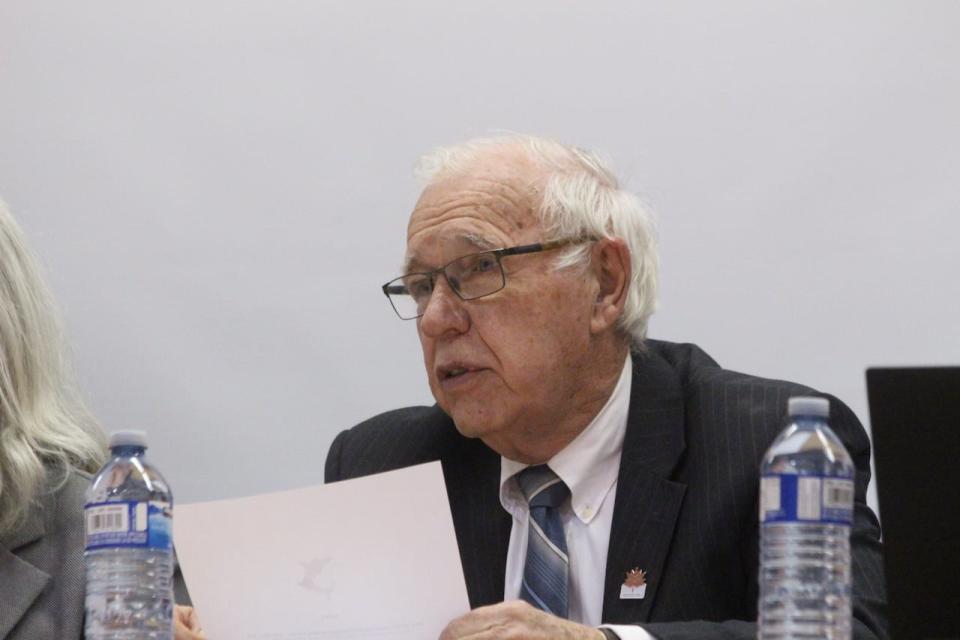Anglophone East rejects minister's ultimatum in Policy 713 legal clash

The Anglophone East district education council has rejected the education minister's demand that it stop spending money on a lawsuit against the government over gender-identity policies.
In a letter to Bill Hogan, chair Harry Doyle says the council will only agree to the demand if the minister promises in writing to not "repeal or remove" the district's policy, which he has already said he is repealing.
Hogan had demanded the council comply with his demands by 5 p.m. Thursday or else he would go to court himself to dissolve the council.
Doyle rejected the ultimatum in his letter.
Provincial law "provides that locally elected DECs, responsible to their electorates, decide how to implement public education in their respective school district subject to the Education Act," he wrote.
'No options,' minister says
Hogan issued a statement about an hour after his deadline saying the DEC had left him "no options but to commence the process for dissolution" of the council.
His statement accused Anglophone East of "diverting almost $300,000 from classrooms to Ontario-based lawyers to file a motion to fight the rights of parents to be informed about their kids under 16."
The minister must apply to the court to dissolve the DEC and it's unclear how quickly that might happen.

Harry Doyle, chair of the Anglophone East district education council, wrote in a letter to Bill Hogan the council will only agree to his demand if the minister promises in writing to not 'repeal or remove' the district’s policy. (Shane Magee/CBC)
It is the latest escalation in an extraordinary legal and constitutional confrontation between the Moncton-based district education council and the minister over the province's Policy 713.
The government updated the policy last year to require school staff to get parents' consent when a student younger than 16 wants to adopt a new name or pronoun at school.
Anglophone East argued that that would violate the rights of students under the Charter of Rights and Freedoms, the Education Act and the provincial Human Rights Act.
The council adopted its own policy on implementing 713, which says school staff "shall respect the direction of the student in regard to the name and pronouns they wish to be called in daily interactions with school personnel and other students."
It has gone to court asking for a judge to block any attempt by Hogan to repeal the policy or dissolve the council.
Hogan argues the council can spend money from its budget "for educational purposes only" and must stop spending on the lawsuit.
This week he threatened to dissolve the council if it didn't comply.
Policy undermines 'public education,' says chair
Doyle argues in his letter that Anglophone East determined "that Policy 713 would undermine public education and reduce educational outcomes, and is inconsistent with the DEC's responsibility to protect its students from harm."
The letter also argues that the Education Act allows the council to sue the province and does not prohibit it from using its budget to do so.
Separately from Thursday's letter, the council has also now outlined its constitutional arguments in its broader legal challenge of the province's changes to Policy 713.
"The provisions single out gender-diverse students, a uniquely disadvantaged minority group, and exacerbate the disadvantage they face," says the statement of claim filed late Wednesday in Court of King's Bench.
It asks the court to declare last year's changes "of no force and effect."

Students from a couple of high schools rallied in Quispamsis over changes to Policy 713 after they were announced almost a year ago. (Roger Cosman/CBC)
A hearing on the council's injunction application is scheduled for June, but the main thrust of the case — the substance of its legal arguments for quashing the province's changes to Policy 713 — would only be heard later.
Forcing school staff in the district to address students with names and pronouns that don't reflect their gender identity would be "contrary to its values and practices," says the statement of claim filed late on Wednesday at Court of King's Bench in Moncton.
"They force Anglophone East to participate in practices that will further disempower and harm its more vulnerable members rather than contribute to their success and enhance the vitality of the community."
The claim cites the Charter's Section 7 on "life, liberty and security of person," Section 15 on equality rights, and Section 16.1 on New Brunswick's dual education system.
That section, which applies uniquely to this province, defines the rights of the anglophone and francophone communities to "distinct educational institutions … for the preservation and promotion of those communities."
Anglophone East argues that the changes to Policy 713 "frustrate" its ability to "promote the vitality" of the anglophone community because they discriminate against 2SLBGTQ+ students who are part of that community.
The government's lawyer in the case has already signalled that he would seek to have the council's entire case thrown out once the statement of claim was filed.
"There is an adequate alternative remedy that's been ignored by the applicants in this case," Clarence Bennett told a hearing on April 17.
The Education Act gives councils 30 days to ask a court to review a "corrective action" taken by a minister.
That is not the process that Anglophone East is using in its case.
Hogan also issued a statement late Wednesday responding to recent comments by Michel Côté, chair of the Francophone South district education council.
Côté told Radio-Canada and CBC News that his council was spending a majority of its time over the last two years "putting out fires" set by the province over decision-making powers and over Policy 713 — to the detriment of focusing on classroom education.
"It is unfortunate that the Chair of the District Education Council feels that way," Hogan said in his statement.
"Our government remains focused on improving our educational system for all students. Moving forward, I am hopeful that we can continue to build on positive endeavours to ensure that all New Brunswickers have access to a high-quality education."
Hogan has demanded that the province's three francophone school districts also repeal their policies on gender identity for being at odds with Policy 713, although there hasn't been any legal action involving those districts.

 Yahoo News
Yahoo News 
